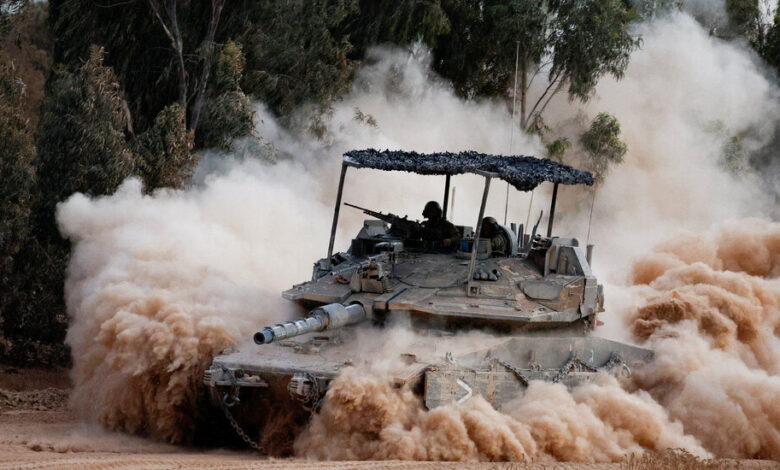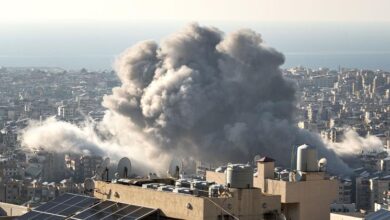Gaza ceasefire talks resume after weeks of stalemate

Israeli negotiators arrived in the Gulf state of Qatar on Friday for the first time in weeks to restart talks on a ceasefire to end the war in Gaza and free hostages held there after weeks of deadlocked talks.
The Israeli delegation to Doha, the capital of Qatar, met with Mohammed bin Abdulrahman bin Jassim Al Thani, Qatar’s prime minister, according to an official familiar with the visit, David Barnea, head of Israel’s foreign intelligence agency Mossad.
Ceasefire talks had been stalled for weeks until Wednesday, when Hamas said it had discussed some ideas with mediators about a new way forward. Both U.S. and Israeli officials said Hamas’s revised stance could allow for a deal, but warned that a long and difficult series of discussions still lay ahead.
An Israeli official, who was not authorized to discuss the matter publicly and spoke on condition of anonymity, described the meeting as a preliminary discussion and said more substantive talks would take place next week.
Both sides will have to work out the identity, number and terms of the release of Palestinian prisoners who will be released in exchange for 120 living and dead hostages held by Hamas and its allies. They will also have to determine the sequence of steps for Israel’s withdrawal and the level of control Israeli forces will have at different stages of the deal.
Most importantly, Israel and Hamas will have to agree on a formula to resolve the main sticking point that has hampered negotiations for months: Hamas has demanded only a complete ceasefire and a full withdrawal of Israeli forces, while Israel has vowed to overthrow Hamas’ rule in Gaza and maintain postwar security control over the territory.
Israel and Hamas have been negotiating on the basis of a three-phase ceasefire framework announced by President Biden in late May. The two sides have refused to negotiate directly, asking Qatari and Egyptian mediators to conduct shuttle diplomacy between them.
Under the terms of the proposed deal, they would first observe a six-week ceasefire during which hostages would be released in exchange for Palestinian prisoners. During those six weeks, officials would negotiate an end to the war and the withdrawal of Israeli troops from Gaza.
Israeli Prime Minister Benjamin Netanyahu has vowed to destroy Hamas’ “military and administrative capabilities” in Gaza and has said the war will not end until that goal is achieved. But Israel’s military establishment — exhausted by the ongoing war in Gaza and weighing the possibility of a full-scale war with Hezbollah in Lebanon — now favors a ceasefire. even at the cost of letting Hamas take power.
Michael Milshtein, a former Israeli intelligence officer, said Israel would not be able to successfully overthrow Hamas, so a ceasefire to bring the remaining hostages home was the least bad outcome.
“This is an extremely hard pill to swallow,” said Mr. Milshtein, who oversees the Palestinian affairs division of Israeli military intelligence. “But there is no good alternative here.”
However, Israel’s political leaders are deeply divided over the proposed deal, which some say would essentially leave Hamas in power in Gaza. Although Israel’s top leadership has given the framework agreement a green light, two senior members of Netanyahu’s coalition have announced their opposition, threatening to leave the government, potentially forcing him to choose between a ceasefire and his political survival.
On Friday, Benny Gantz, an opposition leader who recently quit Mr Netanyahu’s war cabinet, reiterated that he would back the prime minister if he decided to push for a truce to release the hostages. In that case, Mr Netanyahu would be forced to rely on his opponents for support, a potentially explosive situation that would almost certainly push the country into elections.
Netanyahu had not explicitly supported the proposal for weeks. In a television interview last month, he appeared to back away from it, saying he would not accept an end to the war against Hamas. After the hostages’ families objected, Netanyahu backtracked and publicly backed the proposal in late June.
Hamas also faces a similarly complex problem.
In a statement on Friday, Hamas called on all Arab and Muslim countries to pressure Israel to end “the Jewish genocide against our Palestinian people.”
The group also reaffirmed its rejection of any plans or proposals to introduce foreign forces into the Gaza Strip. The idea of an Arab peacekeeping force and, more recently, a United Nations peacekeeping force have been floated as possible solutions to help end the war and Israeli occupation of Gaza.
“The governance of the Gaza Strip,” Hamas said in its statement, “is a purely Palestinian matter, unanimously agreed upon by our Palestinian people in all their diversity.”
Some Gazans increasingly critical The militant group launched the October 7 attack on Israel that sparked the war without doing enough to protect Gazan civilians. And any deal would need the approval of Hamas leader inside Gaza, Yahya Sinwar, whom Israel has vowed to kill for his role in the surprise attack.
Ahmed Yousef, a veteran Hamas member, blamed Israel’s hardline government for the delay in reaching a ceasefire in Gaza. But he said many would likely conclude that the war was not worth the cost in Gaza, even if a deal saw Israel release thousands of Palestinian prisoners in exchange for the remaining hostages.
“Even if many prisoners are released, no one will say there has been any achievement,” said Mr. Yousef, who is now displaced in southern Gaza.
Turkish President Recep Tayyip Erdogan told reporters on Friday that Western countries need to put collective pressure on Israel to achieve a definitive cease-fire. He added that he hoped the intervention of President Joe Biden and Qatar’s mediation efforts would lead to a lasting cease-fire.
As leaders on both sides consider the way forward, Israel’s war in Gaza nears its ninth month. Much of the population has been displaced at least once, many live in tents, and finding enough food and water to survive has become a daily struggle.
Israeli forces resumed fighting Friday in Shajaiye, a neighborhood near Gaza City in the northern part of the territory, in an effort to suppress Palestinian militants there. The Israeli military has been pushing back into areas of Gaza that its forces first swept through months ago as it battles new insurgencies by Hamas and other militant groups.
“The military can talk all they want about disbanding battalions — but in the end, Hamas survives,” Milshtein said. “We can tell ourselves stories all day long, but this is not even close to a complete victory over Hamas.”
King Abdulrahim Contributed reporting from Jerusalem.




